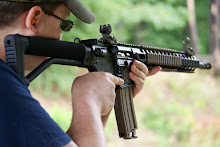I get questions about this allot from newbies who just got their LTC or from curious friends/family who don't carry but know I do:
If I am carrying and I get pulled over, am I obligated to tell the cop that I am carrying a gun?
Not in my state (MA). Being pulled over for a traffic violation has nothing to do with carrying and there is no law requiring me to tell the officer that I have a weapon.
Some states may require you to tell the officer. Check your state laws if you live outside of MA.
What about as a courtesy to the officer?
I have been carrying for over 10 years. In that time I have been pulled over a few times. I have never told the officer that I was carrying and he never asked or "found out". Its not that I want to hide anything from the officer, I just feel that telling the cop that I have a gun could unnecessarily escalate the situation. My own personal policy is that I will not tell the officer I have a gun unless I am asked to exit my vehicle or if the officer decides that he has some probable cause to search my vehicle. Neither situation has ever happened to me while I was carrying a weapon. As for courtesy to the officer, I turn on my interior lights if its night and I don't reach for my registration or license until the officer asks for it so that he can watch me (and can see that I am not reaching for a weapon). I also speak to the officer in a respectful tone (as I would anyone). Thats it.
In Massachusetts I am REQUIRED to carry concealed (ie, no "open" carry) in my vehicle. Concealed means that no one should be able to see your weapon or be able to figure out that you have one in any way. This also means that I should not have a firearm "in plain sight" anywhere in my vehicle. Since the cop can't see that I have a gun, I don't tell him.
I should mention that I have recently read about this topic on the masscops forum. There were cops there that stated that they appreciate it when the person they pull over tells them if they are carrying. They say that they see it as a good jesture. But, some of those same cops mentioned that if you do disclose that you are carrying, that you should be prepared for the possibility that some officers may be more stern or even take your firearm for the duration of the stop. It was also mentioned that the firearm may be unloaded by the officer and put in your trunk! This is exactly the "escalation" that I want to avoid.


